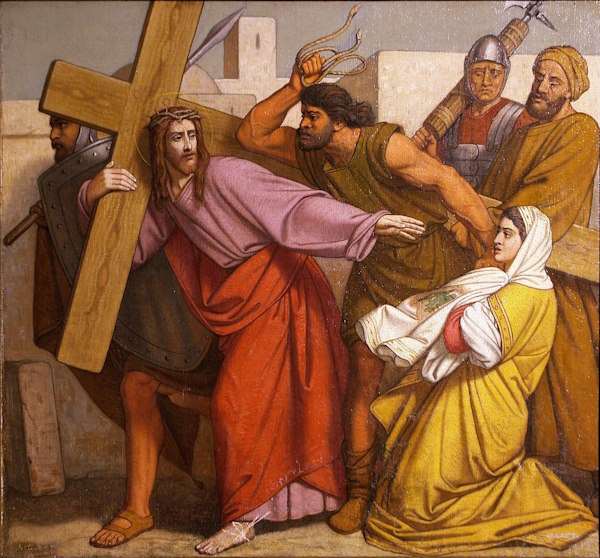| Friends Share and Even Love One Another’s Crosses |
The following article is taken from Selected Letters of St. Francis de Sales.To prepare for our chat on Sunday, please read the article, which is reproduced below, and review the questions at the end.Click for Living Jesus Chatroom  By Saint-Jean-Baptiste au Béguinage, Brussels (Public Domain) By Saint-Jean-Baptiste au Béguinage, Brussels (Public Domain)To the Baronne de Chantal Annecy, 13 October 1605, Having till now been held back by a mass of urgent business, my dear daughter, I am about to leave for this visitation which I call blessed and where I see crosses waiting for me at every turn of the road. My flesh shrinks at the thought but my heart adores it. Yes, I hail you, little crosses and great, spiritual or temporal, exterior or interior; I salute you and kiss you, unworthy as I am of the honour of being in your shadow. Why am I telling you this? It is because, my so very dear daughter, I adore your crosses with the same affection, and look upon them as mine, and I want you (at least, I beg you) to love mine in the same way. I have had a good many crosses since the Pardons [A pilgrimage made every seven years from 6-8 September to Notre-Dame de Liessc at Annecy] here, but they were short and light. Strengthen the weakness of my shoulders, O God, and only weigh them down with a small load, so as to make me realize clearly what a poor soldier I should be if I were to see the armies face to face. How your letters consoled me, my dear daughter! They are full of good desires, courage and resolution. O how well things are going! And let the enemy threaten and rattle the doors all around us; for God is in our midst, in our heart, and he will always stay there if it is his good pleasure. So stay with us, Lord, because it is towards evening. [Luke 24:29] I will say no more to you, nothing about your great project of leaving all things and yourself for God, nor about your going forth from your own country and from your parents’ house. No, I do not wish to talk about it; may God be pleased to enlighten us and show us his good pleasure, for at the peril of all that is in us we will follow him wherever he leads. O how good it is to be with him, wherever it may be! I am thinking about the soul of my very good and very holy thief. Our Lord had told him that his soul would be with him in paradise that day; and no sooner was it separated from his body than he at once led it down to hell. Yes, for the soul was to be with our Saviour, and our Saviour had gone down into hell: so the soul went with him. What do you suppose it felt like when it got down there and saw this abyss before its inward eye ? I think it must have said with Job: Who will grant me this, O my God, that thou mayst preserve and protect me in hell? And with David: No, I will fear no evil, for, O Lord, thou art with me. No, my dear daughter, while our resolutions hold good, I will not be anxious on your account. Even if we die, and if everything goes wrong, I shall not mind as long as one resolve is firm. Night is as day to us, when God is in our heart, and the day is as the night when he is not there. As I am pressed for time I must end this letter. I pray that Our Lord may make you more and more his; that he may guard your resolutions, defend your widowhood, direct your obedience; that he may be yours and all yours. I pray our holy Abbess, our dear Lady and Queen, ever to be gracious to us and to make us die and live in her Son. I am incomparably yours, my dear daughter, I am all yours, in the merciful love of the Son and of his Mother, Francis, Bishop of Geneva. Reflections: In the second paragraph of the letter, St. Francis suggests to St. Jane de Chantal that they mutually accept each other’s crosses. How can this be carried out with our friends? How is this helpful to both parties?St. Francis says that “How your letters consoled me, my dear daughter!” Is this just hyperbole, written in a time when much flourish was added to letters? Or was it a shadow from his past? Consider St. Francis’ youthful bout with depression, in which he thought his soul was damned.Assuming that by the words the “great project of leaving all things and yourself for God,” the saint meant St. Jane’s foundation of the Visitation Order, talk about how important it is for any of our projects to follow the Lord where ever he leads. Why does St. Francis bring in the discussion of the good thief? How does it fit in with his message in the letter?In the last paragraph, that begins with “Even if we die….,” how is this an encouragement for us when things don’t go well? Sign up for our Living Jesus Chat Room:Come to our Living Jesus Chat Room, 7:30 PM to 8:30 PM Eastern Time |